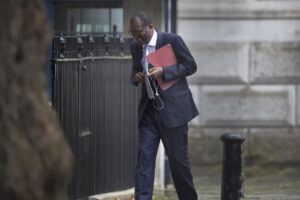
Borrowing costs for British companies have surged as the fallout from Friday’s mini-budget continues to reverberate around bond markets.
Sterling corporate bond prices look set for their biggest monthly fall since the late 1990s, despite Bank of England moves to try to stabilise the market.
The Markit iBoxx Sterling Corporate Bond Index has fallen by 10.2 per cent so far in September to a price of 296, its lowest level since the start of 2016 and on course for the biggest monthly slide since at least 1999.
Yesterday the Bank made an emergency intervention in financial markets with a plan to start buying long-term government debt. The Bank said it would buy bonds on “whatever scale is necessary” to calm the turmoil.
Sarang Kulkarni, credit portfolio manager at Vanguard, an investment management group, said the measures had helped to ease conditions in the bond market, but added that average yields were still close to 7 per cent. That was up from 5.5 per cent before Kwasi Kwarteng announced his tax cuts and a plan to fund them with borrowing, sparking a widespread sell-off of UK assets.
Kulkarni said that yesterday’s announcement by the Bank was “intently expressed at bringing down that volatility. It’s too early to say this is over, there will potentially be more technical pressure across the market as everyone tries to raise liquidity.
“The budget announcement has caused unintended consequences for the UK’s growth outlook. Yields at 7 per cent are a challenge for some companies, especially as we are going into a slowdown, but at the same time well-capitalised companies are also trading at attractive yields.”
Mike Riddell, a fund manager at Allianz Global Investors, warned before the Bank’s announcement that liquidity in the corporate sterling market was “almost non-existent” at the moment. The UK corporate market is smaller than the dollar and euro markets.
The ICE BofA Sterling non-Gilt Index, which measures the prices of investment grade debt, is set for its worst monthly performance since records began in 1997. It is down 9.8 per cent in September with a price of about 337 at Tuesday’s close, the lowest since 2015.
Jim Leaviss, a fund manager at M&G, said that credit spreads across markets had been widening for several weeks, although there was “definite underperformance” in the UK.
Read more:
Borrowing costs for UK companies are climbing





